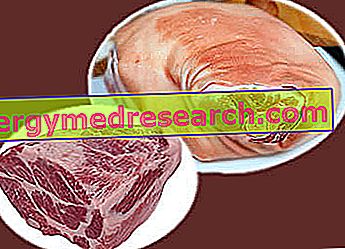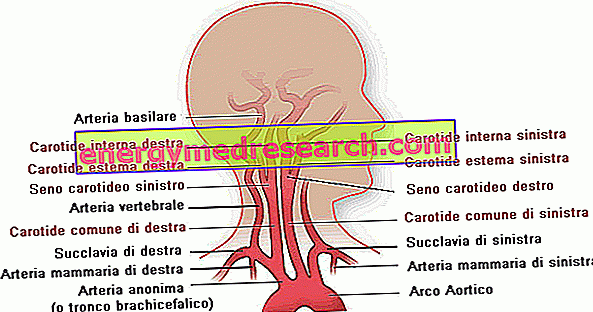Generality
Strengthening the immune system is a need to provide when they are compromised or weakened by factors such as stress, certain pathologies, excessive use of antibiotics, cold, change of season, improper nutrition, inadequate night rest, etc. . In these situations, the poor effectiveness of the immune army leads to greater susceptibility to infections (diseases triggered by infectious agents such as bacteria, viruses, fungi and parasites).

If the healthy lifestyle needs support, it can be helpful to resort to the diverse group of medicinal plants with an immunostimulant and adaptogenic action, which nature has always offered.
Brief review of the immune system
For an organism, the immune system is the best bulwark against threats from the external environment - such as viruses, bacteria, parasites etc. - but also from the inside - like for example the cells gone mad (tumor cells) or malfunctioning.
To fulfill its protective functions, the immune system can count on various organs, tissues, cell types and glycoproteins; together, all these elements make up a sort of "army" deputed to activate and attack anything that constitutes a potential threat to the organism.
The tissues and organs that make up the immune system include the skin, spleen, tonsils, bone marrow, thymus and lymph nodes ; among the cells of the immune system, the white blood cells (granulocytes, monocytes and lymphocytes) deserve a mention; finally, among the immune system glycoproteins, antibodies are remembered.
Strengthen the immune system
Strengthening the immune system is a necessity that arises when something weakens them, making the body of the person concerned more susceptible to infections and other problems.
What weakens the immune system?
Today, the main causes of the weakening of the immune defenses are: stress, some pathologies (eg colds), excessive use of antibiotics, various environmental factors (eg: cold, humidity, change of season, excessive sun exposure, etc.). ), improper nutrition, inadequate night rest, sedentariness, physical fatigue and advancing age.
- Stress : the conditions that cause psycho-physical stress weaken the immune system, as they subject it to a greater workload. Making a comparison, it is as if stress strains the immune system by entrusting it with numerous tasks and the latter, consequently, becomes less efficient.
- Inordinate use of antibiotics : at the intestinal level, the human body hosts particular bacteria, with which it establishes a symbiotic relationship: in exchange for the hospitality offered by the intestine, these bacteria - which together are called bacterial flora - guarantee various services, including: damping the proliferation of those potentially pathogenic microorganisms normally present in some parts of the body (eg Candida albicans ) and modulating the intestinal immune system.
The excessive use of antibiotics can deplete the bacterial flora, which, at that point, is no longer able to fulfill its functions. From this it follows that potentially pathogenic microorganisms such as Candida albicans can take over and proliferate, and the immune defenses of the intestine lose their effectiveness.
- Sedentariness and inadequate night rest : scientific studies have shown that sedentary people and those who sleep less fall more easily sick than individuals with an active life and those who sleep 7-8 hours per night.
Therefore, the researchers concluded that there is a link between the weakening of the immune system and factors such as a sedentary lifestyle and insufficient night rest.
- Improper nutrition : for example, inadequate protein intake compromises the production and functionality of those glycoproteins that are a fundamental part of the immune system.
- Advanced age : aging causes the white blood cell-producing immune organs to be less effective. Unfortunately, it is a destiny that inevitably belongs to the human organism and against which it is impossible to oppose in a radical way.
Curiosity
In addition to the elements indicated above (thymus, spleen, bone marrow etc.), the mucus that covers some hollow organs of the human body (eg, the organs of the digestive system) and gastric juices are also part of the immune system.
Together with the layers of the skin, mucus and gastric juices they constitute the so-called natural immune barriers of the organism ; these barriers represent an important defensive line, which cooperates with antibodies and lymphocytes in strengthening the protective shield against invading pathogens.
How to strengthen the immune system?
According to the unanimous opinion of the medical-scientific community, the best way to strengthen the immune system is to adopt a healthy lifestyle . Moreover, it is a fact that, with the adoption of a healthy lifestyle, any organ, system and system of the human body - including the immune system - works better and more effectively.
The strengthening of the immune defenses, through healthy life behaviors, is based on some cornerstones, which are:
- The proper diet . The custom of consuming fruit, vegetables, whole grains and yogurt, perhaps associated with the intake of prebiotics and probiotics (live lactic acid bacteria), and the good habit of limiting the intake of foods rich in saturated fats, are the basis of a regime correct food and to reinvigorate the immune system.
- Physical activity . Sport helps to boost the immune system, as long as it is practiced in an intelligent, balanced and without excess.
With regard to the beneficial effects of sport on immune defenses, interesting scientific studies have shown that regular exercise improves the function of neutrophils, which is one of the cellular components of white blood cells.
- Maintaining the body weight standard . This aspect is closely connected to a balanced diet and constant exercise.
- The limitation of alcoholic beverages . Alcohol abuse is seriously damaging to health and has a depressive effect on the immune system.
- No smoking . Everyone has heard of the countless damages of cigarette smoking; among these damages, the weakening of the immune defenses is also included.
- Get enough sleep. During nighttime sleep, the human body re-elaborates the proteins introduced by the diet and uses them to fight potential pathogens. Those who do not sleep enough during the night cannot use proteins for this purpose, so they are more vulnerable to infections.
- Normal blood pressure maintenance.
- Observe the rules of proper personal hygiene .
If the correction of eating habits, sport, the limitation of the consumption of alcohol, etc. were not sufficient to revive the immune defenses, it is possible to make use of the resources that nature has always offered to human beings: the variegated group of medicinal plants with immunostimulant and adaptogenic action. In fact, these plants are an excellent aid to strengthening the weakened immune system.
Meaning of adaptogen
Adaptogen is defined as any substance, drug or herbal remedy capable of increasing the resistance of the organism to various stressors, both physical and mental, in a non-specific way.
Herbal remedies
In herbal medicine you can buy different natural preparations (also called "drugs"), specially designed to strengthen the immune system.
These preparations have different indications, therefore the choice of one rather than another varies according to the cause of the weakening of the immune system.
For example, if the trigger is stress, drugs with a targeted antioxidant action (to reduce free radicals that contribute to stress) are used, tonic-stimulating and immune-stimulating; while, if the cause is physical fatigue fatigue, it is good to opt for drugs with cardiotonic activity, exciting and immuno-modulating, in order to invigorate and give charge to the body.
How to orient yourself: some tips
The natural market offers a wide range of herbal preparations: based on personal needs and under the advice of the herbalist, the client who needs to strengthen the immune system can choose between effervescent sachets, herbal teas, operculums, energy bars and elixirs, which exercise the same effect. Often, habits and rhythms of life affect the choice: for example, operculums are more practical for people who do not have much time available (due to work, due to large families, etc.), while herbal teas are better suited to those people which, in addition to having to strengthen the immune system, feel the need to relax.
The following is a model of herbal preparation - namely effervescent sachets - useful for strengthening the immune system.
EFFERVESCENT BAGS
The effervescent sachets are placed halfway between the most complex herbal formulations (eg: herbal teas) and the more prominent ones (tablets). At first glance, this product to strengthen the immune system seems very complex; in reality, as will be seen, it is a very simple herbal preparation. The components destined to reinvigorate the immune system are only two - echinacea and astragalus - while all the other elements are useful for the success of the product:
- Citric acid and bicarbonate : contribute to the best organoleptic perception of the product. They do not affect the strengthening of the immune system in any way.
- Beta-carotene ( precursor of vitamin A ): in this case, beta-carotene is exploited not so much for its antioxidant activity, but to attribute a "lively" color to the effervescent preparations. As is known, in fact, beta-carotene is the pigment that gives the classic orange color to those vegetables that contain it (eg: carrot or pumpkin).
For its reasons of use in such preparations, the beta-cardboard can be considered a " corrigens " element, inserted not to improve the taste, but to give a bright tint to the formulation.
- Saccharin sodium : it is a sweetener. The effervescent sachets dissolve in water, so the product must be pleasant to the taste. Sweeteners such as sodium saccharin provide this.
- Natural aromas of lemon and orange : the reasons for their inclusion in the formulation are the same as for sodium saccharin (organoleptic pleasantness). Also in this case, the aromas serve as a "boundary" for the product and do not strengthen the immune system.
- Inulins : they are fructose polymers, useful for improving the delivery of substances present in effervescent preparations (they favor a slow release).
- Echinacea ( Echinacea purpurea ): thanks to its powerful ability to strengthen the immune system, it is considered the quintessential immunostimulant plant. Its phytocomplex includes: echinacoside, caffeic acid, cinnamic acid (phenylpropanes), glycoproteins and heteropolysaccharide molecules.
It is particularly indicated for the prevention of colds, flu, herpes, stress situations.
- Astragalus ( Astragalus membranaceus ): its phytocomplex is rich in triterpene saponins, glycosylated flavonoids and heteropolysaccharides.
Triterpene saponins and flavonoids promote anti-inflammatory activity (NB: the former also have tonic and stimulating effects on fertility); the heteropolysaccharide fraction, on the other hand, enhances the immunostimulatory action of echinacea.
Thanks to the combined (or synergistic) action of its components, the astragal represents:
- A powerful adaptogen and a tonic-stimulant;
- A stimulant of the central nervous system (CNS). It is in fact a factor that induces wakefulness (for this reason it is not recommended to take astragalus in case of insomnia and before going to bed);
- A useful remedy to improve coexistence with colds;
- A direct cardiotonic. Flavonoids promote an increase in the strength of cardiac contraction ( positive inotropic effect );
- An indirect cardiotonic, thanks to its adaptogenic and tonic-stimulating properties;
- A stimulant that increases heart rate ( positive chronotropic effect ).
Curiosity
According to popular beliefs of the past, astragalus was an aphrodisiac, due to its supposed ability to increase sperm activity.
Effervescent sachets are a good example of a herbal preparation designed to strengthen the immune system.
In any case, it will be the task of the herbalist to advise the customer the most convenient and suitable remedy for his needs. For example, rather than echinacea and astragalus, sports lovers need preparations based on ornithine, glutamine and arginine, all of which are particularly suitable for strengthening the immune system.



